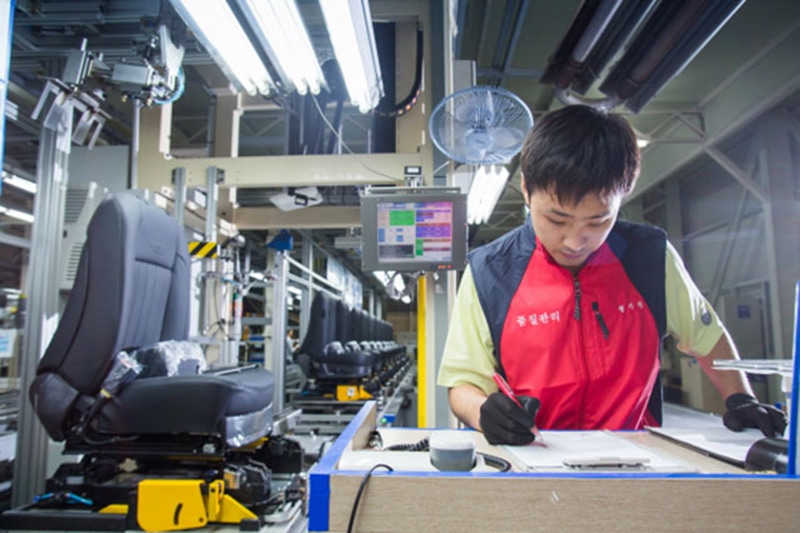Hyundai Workers Trounce Tentative Wage Pact
The Korean Metal Workers Union actively campaigned against the agreement, which failed by the largest margin in union history. Labor unrest is cited as the reason GM CEO Mary Barra canceled a planned trip to Korea.

Saying the wage offer was too low, Hyundai union workers in South Korea have devastatingly rejected the tentative labor agreement that had been reached two days earlier.
Some 78% of the 45,777 workers who voted on Friday, Aug. 26, turned down the pact. A record 92% of Hyundai workers participated in the vote.
Jang Chang Yeol, president of the Hyundai branch of the Korean Metal Workers Union (KMWU), says the company’s wage offer was significantly less than the pay increase they received last year.
It was also revealed factions within the union had organized “vote no” campaigns. Union and company officials say the labor talks will resume in September.
The tentative agreement called for a 58,000 won ($52) average monthly wage increase, a 3.3 million won ($2,960) incentive bonus, a regular bonus of three and one half months’ pay, 200,000 won in gift certificates ($179) and 10 shares of Hyundai Motor common stock.
Last year, workers at both Hyundai and its sister company, Kia, received an 85,000 won ($70) monthly wage increase. Korean unions typically push for higher raises with each new contract.
So far, partial strikes by the union have wounded Hyundai’s vehicle output, causing production losses of 65,500 units with a value of 1.4 trillion won ($1.25 million). However, union members suffer very little economically from waging partial strikes.
In Korea, auto industry workers receive 100% of their basic monthly salary, regardless of how many hours of work are missed through strike action. They also receive complimentary or highly subsidized breakfast and lunch in the company cafeteria, some housing subsidies and family educational benefits.
Hyundai’s sister company, Kia Motors, also is deep into negotiations with its labor union. Inside union reports suggest the mood is tense.
Last year, Kia workers ratified a new wage agreement after 16 negotiating sessions without causing a single hour of lost production due to strike action. That wage agreement was reached on Jan. 6 this year and ratified by 64% of workers who voted Jan. 10.
Kia broke its 2015 non-strike record this year by waging a 4-hour partial strike in July in order to participate in a national demonstration with Hyundai, GM Korea and other unions. The union was publicly criticized for not giving the company legally mandated strike action notice.
A Kia spokesman says the company is continuing to enforce its policy of not commenting on labor negotiations. The policy went into effect with the start of negotiations in 2015.
However, the worker turndown of Hyundai’s tentative deal is certain to have an effect on Kia negotiations, analysts believe. The Kia union tends to copy whatever gains Hyundai workers are able to make.
Last year, Kia workers attained the same wage and bonus package that Hyundai workers ratified. The only difference was that Hyundai workers received 20 shares of Hyundai stock while Kia workers received 55 shares of the less-expensive Kia stock.
Negotiations have been tough this year for Korea’s entire automotive industry. Only one of Korea’s five automakers, Ssangyong, has reached an agreement.
Ssangyong employees ratified a new contract on July 28, which gave workers a monthly pay hike of 90,000 won ($44) and a 4 million won ($3,300) bonus. The two sides also signed an agreement to work jointly on product development and employment stability.
There has been no strike action at Ssangyong for the past seven years.
Barra Cancels Trip to Korea
At GM Korea, an unhealthy labor environment reportedly caused GM CEO Mary Barra to cancel her planned trip to Korea to deliver a major speech to the American Chamber of Commerce.
Barra was scheduled to meet with GM Korea workers at the Bupyeong headquarters on Aug. 26 and compliment them on attaining record high sales performance in Korea.
According to reports in Korea, not confirmed by the company, the GM Korea branch of the KMWU is demanding a wage hike of 152,000 won ($133), a bonus of four months’ pay, incentives and union participation in business development and new product planning.
It is virtually identical to the earlier wage demands of Hyundai. The KMWU set a basic pattern wage and working demand for Hyundai, Kia and GM Korea.
It also has been reported in Korea that the GM Korea workers union is negotiating directly with some of the officials from GM International Operations who are based in Shanghai.
Company spokesmen did not answer any questions about the negotiations when asked by WardsAuto.
At Renault Samsung Motors (RSM), Korea’s fourth largest automaker in terms of sales, negotiations are ongoing, with neither side commenting.
It is noted RSM workers receive just 70-to-80% of the 97 million won ($86,400) average annual pay level of workers at Hyundai and Kia.
The union broke with industry tradition when it permitted RSM to place the Nissan Rogue on the same assembly line that produces its other models.
The addition greatly increased the number of parts and assembly operations on that line, which is an increased burden on workers. However, the Rogue is enabling RSM to maintain production levels and keep its workforce on the job.
About the Author(s)
You May Also Like
_(2).jpg?width=700&auto=webp&quality=80&disable=upscale)


